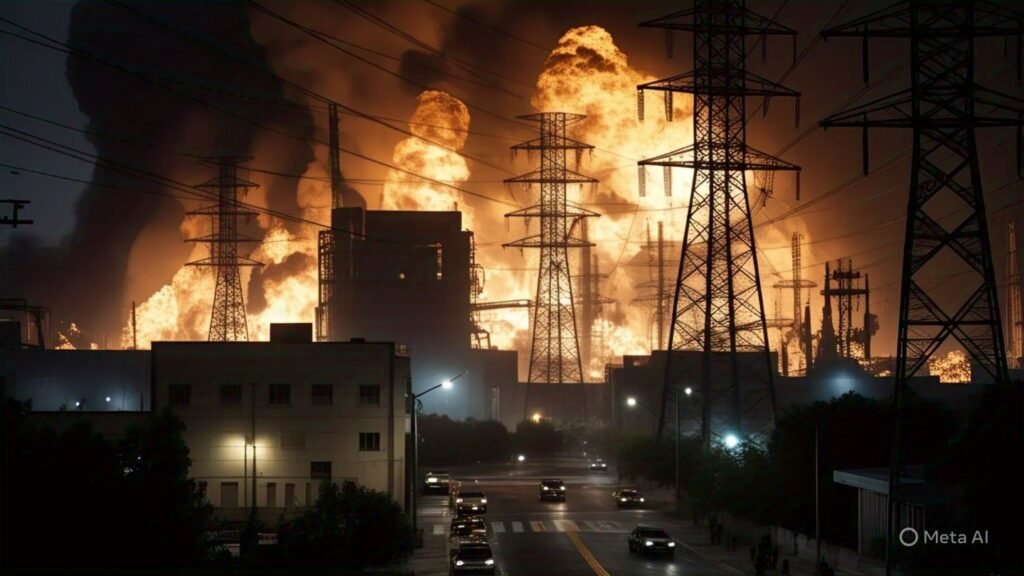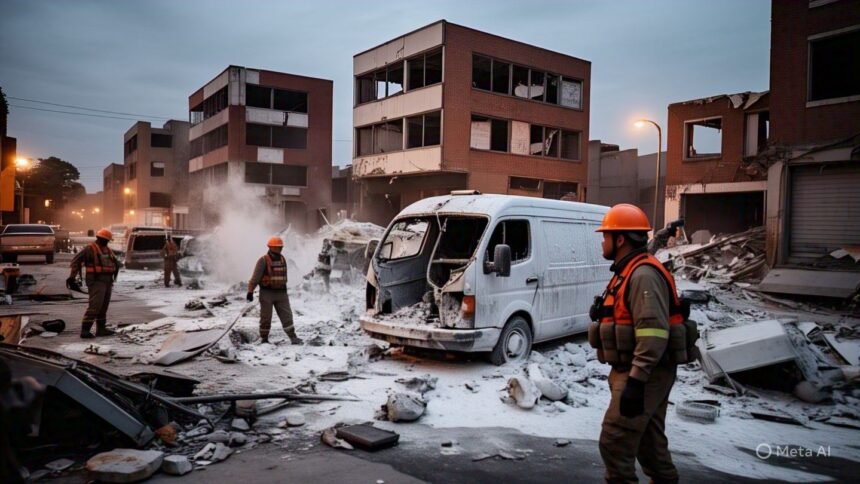Israel Continues Airstrikes as Reports Suggest Iran
For the fourth day in a row, Israel and Iran exchanged heavy fire on Monday, intensifying concerns that the conflict could spiral into a broader regional war, potentially pulling in other nations from the oil-rich Middle East and forcing greater U.S. involvement.This News is Publishes by:Movie box
Iran launched multiple waves of drone and missile attacks over the past 24 hours, while Israel continued its targeted airstrikes deep inside Iranian territory, including Tehran, resulting in the death of another senior Iranian military figure.

Since the outbreak of violence on Friday, Iranian officials have reported 224 fatalities, most of whom are said to be civilians. Israeli authorities stated that Iranian strikes have killed 24 people in Israel and left nearly 600 injured.
Israel Continues Airstrikes as Reports Suggest Iran ,The situation escalated rapidly on Friday when Israel struck key Iranian military and nuclear sites, eliminating several high-ranking generals and nuclear scientists. Since then, Israel has reportedly gained significant air dominance over parts of Iran, including the capital, Tehran, severely limiting Iran’s ability to mount an effective air defense.
In response, Iran has retaliated with a barrage of drones and ballistic missiles aimed at Israel. According to Israeli National Security Adviser Tzachi Hanegbi, Iran is still believed to have thousands of missiles in its arsenal.
Former U.S. President Donald Trump has offered mixed messages throughout the conflict. Initially, he encouraged Iran to pursue a nuclear agreement, but later posted on Truth Social that both sides “should make a deal, and will make a deal,” adding, “We will have PEACE, soon, between Israel and Iran! Many calls and meetings now taking place.”
Financial markets, which were already showing signs of stabilizing early in the week, appeared less alarmed before reports from The Wall Street Journal reignited concerns. Analysts currently expect a limited-scale conflict but caution that the timeline for resolution remains uncertain.
“There’s a prevailing view that the fighting may not escalate to a full-scale war, but there are no strong signals that the clashes will stop anytime soon,” said Jochen Stanzl, chief market analyst at CMC Markets.
Ongoing airstrikes in the region are also raising alarms over potential disruptions to key maritime routes.
Iran reported an explosion on Saturday at one of its gas processing plants connected to the South Pars gas field. Although Iran exports relatively little natural gas and its oil infrastructure has not yet been directly targeted, concerns over energy supply are intensifying. Global energy prices, which spiked on Friday, may climb even higher if the conflict persists.
Meanwhile, the International Atomic Energy Agency (IAEA) called an emergency session to address Israel’s attacks on Iranian nuclear facilities, which have also disrupted international oversight of Iran’s enriched uranium reserves. The IAEA’s board is meeting in Vienna to evaluate the situation, following a recent vote that found Iran in violation of its nuclear commitments.

Israel Continues Airstrikes as Reports Suggest Iran,Global Reactions and Diplomatic Concerns
The ongoing clashes between Israel and Iran have drawn urgent responses from the international community. Several European nations, including France and Germany, have called for immediate de-escalation, warning that a prolonged conflict could destabilize the entire Middle East. The United Nations Security Council is reportedly considering an emergency session to address the rapidly evolving situation and prevent further civilian casualties.
Impact on Global Energy Security
Energy experts are increasingly concerned that the sustained military operations could significantly impact global oil and gas supplies. Although Iran’s gas exports are minimal, fears are growing that nearby shipping lanes, particularly the Strait of Hormuz, could become targets or be restricted. Such a scenario would likely lead to sharp increases in global fuel prices, compounding existing economic pressures.
Regional Alliances Under Strain
The conflict is also testing long-standing regional alliances. Gulf countries like Saudi Arabia and the United Arab Emirates have so far maintained a cautious stance, calling for peace while quietly preparing for potential spillovers. Some analysts suggest that the balance of power in the Middle East could shift dramatically if the clashes persist, forcing neighboring nations to reconsider their defense strategies and diplomatic ties.
Heightened Cybersecurity Threats
In addition to conventional warfare, cybersecurity experts are warning about the possibility of large-scale cyberattacks. Both Israel and Iran have well-known cyber capabilities, and intelligence agencies suspect that digital infrastructure, including financial systems and power grids, could become key targets. The threat of cyber warfare is adding another dangerous layer to an already volatile conflict.

Uncertainty in Financial Markets
Global financial markets remain highly sensitive to developments in the Israel-Iran conflict. While initial market reactions were muted, continued reports of airstrikes and drone attacks are increasing investor anxiety. Analysts now predict that sectors such as aviation, shipping, and energy may face heightened volatility if the situation fails to stabilize soon.
✅ Positive Aspects
1. Potential for Diplomatic Resolution
Despite the ongoing hostilities, there are indications that both sides may be open to negotiations. Former U.S. President Donald Trump’s remarks about “many calls and meetings now taking place” suggest that international diplomatic channels are actively working behind the scenes to de-escalate the situation.
2. Regional Powers Urging for Peace
Neighboring countries and international organizations like the United Nations and the International Atomic Energy Agency (IAEA) are pushing for an immediate ceasefire. This global pressure could eventually steer both Israel and Iran toward peaceful talks.
3. Controlled Financial Reaction
While initial reports shook global markets, financial analysts currently expect the conflict to remain limited in scope. Markets have shown some resilience, indicating that investors believe a large-scale regional war is still avoidable.
4. Improved International Oversight
The IAEA’s emergency involvement and international focus on Iran’s nuclear sites may lead to stronger global monitoring and potentially new nuclear agreements, which could contribute to long-term stability.
❌ Negative Aspects
1. Escalation Towards Regional War
The intensity of airstrikes and missile attacks is raising serious concerns that the conflict may spread to neighboring countries, pulling in other regional powers and even leading to broader Middle Eastern instability.
2. High Civilian Casualties
Iran has reported over 224 fatalities, most of whom are civilians. Israeli casualties are also rising. The increasing civilian death toll is exacerbating humanitarian concerns and could provoke further international condemnation.
3. Threat to Global Energy Supply
Ongoing attacks in the region, particularly near key maritime routes and gas processing plants, are raising alarms about potential disruptions in global energy supplies. If oil infrastructure is directly targeted, energy prices could spike drastically.
4. Uncertainty in Diplomatic Signals
Mixed messages from international leaders, including conflicting statements from Donald Trump, are creating confusion and uncertainty about the direction of the conflict. This lack of clarity may delay meaningful peace efforts.
